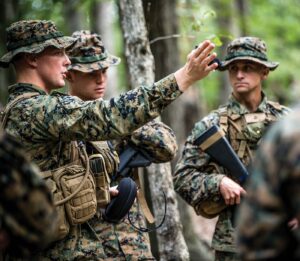How Well Do You Know the US Marines?
Although the smallest branch of the Department of Defense, the US Marines play an essential role in protecting our country. All 223,500 service members take part in maintaining the safety and order of our nation.
Creation of the US Marines
The Marine Corps were formed in 1775 as a land force under the Navy. However, it was not until 1798 that the Marines became an official branch of our country’s military. The Marine Corps were officially recognized as a part of the United States Navy in June 1834.

What Marines Wear
There are a few factors that can help you identify a Marine. For example, Marines do not wear berets. They are only allowed to salute while wearing a cover, and can only wear covers indoors when they are “under arms”. They have three different types of uniforms that include “field”, “dress”, and “service”.

Who They Are
While the Marine Corps consist of roughly 223,500 members, not all of these individuals perform the same tasks. About 186,000 are active duty members, while roughly 38,500 are personnel in reserve. Around 38,000 new recruits are brought on every year and trained at one of the 35 base camps worldwide. There are over 300 different jobs that can be found under the Marine Corps, ranging from occupations such as Aircraft Defense to Computer Technicians.
What Marines Do
Marines have multiple responsibilities that include air, land, and sea protection. Marines manage and guard U.S. Navy ships, naval bases, and U.S. embassies. They oversee radar equipment, surveillance of territory, operate aircrafts, and repair radios, vehicles, and other equipment. They are known for their ability to mobilize quickly in cases of international crises. 
Benefits
Marines are compensated in more ways than one for their dedicated service. Promotions are available based on work ethic and performance of tasks. Marines actually choose their own career path and occupation depending on what they feel they would excel the most in. They also have the option to continue their schooling while on duty, possibly even at a lower cost.
